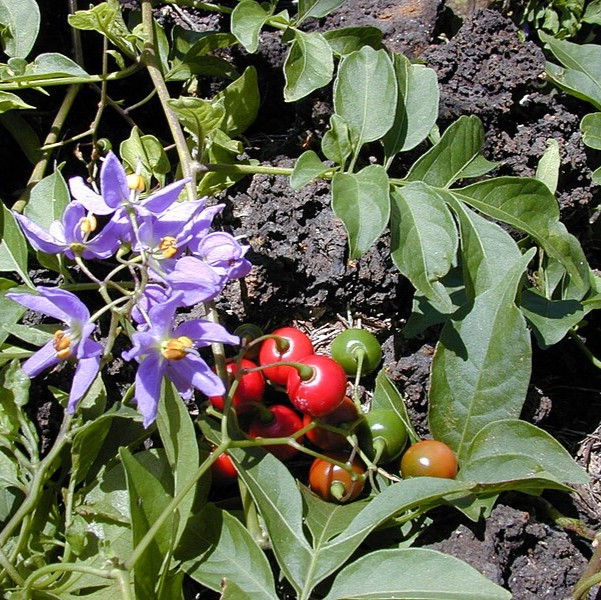Solanum seaforthianum
Overview
| Genus | Solanum |
| Species | seaforthianum |
| Common Name | Brazilian nightshade |
| Abbreviation | S. seaforthianum |
| Ploidy | Diploid |
| Chromosome Number | 2n=2x=24 |
| Genome Size | 910 Mb |
| Genome Assemblies | 1 |
| Cross Reference | NCBI taxon: 45840 |
Organism Image

Description
Solanum seaforthianum, the Brazilian nightshade, is a flowering evergreen vine of the family Solanaceae native to tropical South America. As a member of the Solanum genus, it is related to such plants as the tomato and potato. It is characterized by clusters of four to seven leaves and can climb to a height of 6 m (20 ft) given enough room. It blooms in the mid to late summer with clusters of star-shaped purple inflorescence followed by scarlet marble-sized berries. The plant is highly heat resistant, but cannot tolerate frost conditions. The plant contains modest amounts of various tropane alkaloids such as atropine, scopolamine and hyoscyamine and should be considered mildly toxic and inedible. Promising molluscicidal and schistosomicidal activities were displayed for the S. seaforthianum extracts and fractions which are attributed to the glycoalkaloid content.
The species has become widely naturalised outside its native range and is an invasive species in Australia, Africa, Indochina, the Pacific Islands and India, choking native vegetation and poisoning livestock.
Whole Genomes
Whole Genome Sequences & Annotations for Solanum seaforthianum
S genes
Solanum seaforthianum gwh_assembly PI 688412 01 S genes
| Query | Chromosome | Size(bp) | Coordinates | BLASTn Hit | BLASTn %ID | Domain |
| SLF18 | GWHBKCD00000001 | 82770660 | 34265030-34263918 | Solanum tuberosum DM8.1, SLF18 | 89.6 | F-box |
| SLF15 | GWHBKCD00000001 | 82770660 | 81136716-81137975 | Solanum tuberosum DM8.1, SLF15 | 89.6 | F-box |
Downloads
The Solanum seaforthianum S gene sequences are available in FASTA format.
| CDS and Protein (FASTA file) | S-gene_Solanum_seaforthianum |
Publications
Wu Y, Li D, Hu Y, Li H, Ramstein GP, Zhou S, Zhang X, Bao Z, Zhang Y, Song B, Zhou Y, Zhou Y, Gagnon E, Särkinen T, Knapp S, Zhang C, Städler T, Buckler ES, Huang S. Phylogenomic discovery of deleterious mutations facilitates hybrid potato breeding. Cell. 2023 May 25;186(11):2313-2328.e15. doi: 10.1016/j.cell.2023.04.008.